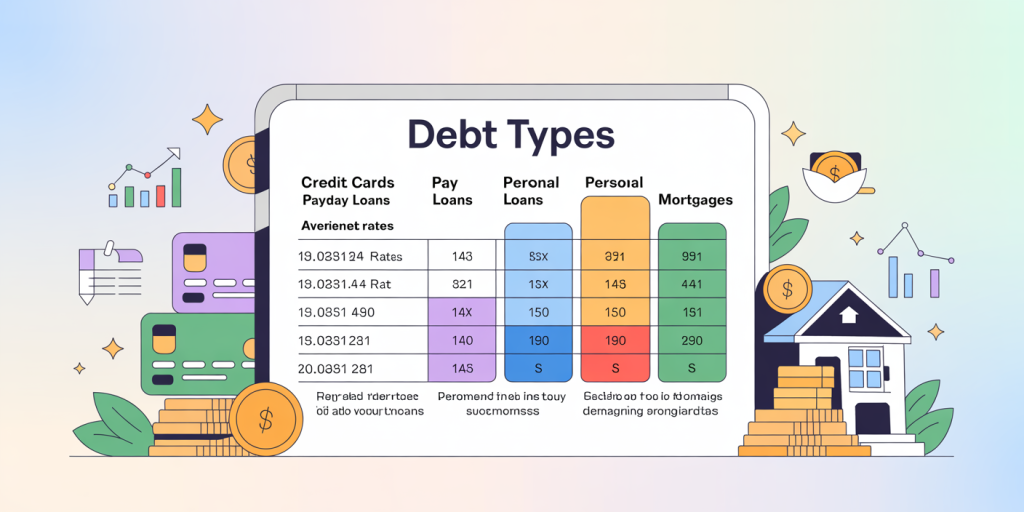Top 7 Personal Finance Mistakes and How to Avoid Them
Managing personal finances effectively is key to achieving financial stability and long-term wealth. However, many individuals fall into common traps that hinder their ability to grow wealth or even maintain financial security. This article explores the top seven personal finance mistakes that people frequently make, analyzes why these errors can be costly, and provides practical strategies to avoid them.
Understanding the Impact of Financial Decisions
Every financial decision made, whether small or large, plays a crucial role in shaping an individual’s financial trajectory. According to a 2022 survey by the National Endowment for Financial Education, nearly 60% of Americans admit to making regrettable money decisions that negatively impacted their financial health. These detrimental choices often stem from lack of awareness, poor planning, or emotional spending habits.
For instance, spending beyond one’s means can snowball into a cycle of debt that is hard to break free from. Conversely, informed and deliberate financial strategies enable individuals to build emergency funds, plan for retirement, and invest wisely. Understanding the cost and consequences of personal finance mistakes is essential to fostering better money habits. This section sets the stage for deeper analysis of the seven critical errors and how to sidestep them.
Mistake 1: Ignoring Budgeting and Expense Tracking
One of the most fundamental errors many people make is neglecting to create and follow a budget. Budgeting serves as the backbone of financial management, providing insights into where money is coming from and where it goes. Without tracking income and expenses, overspending can occur without realization until financial strain sets in.
For example, a consumer report by Experian found that 45% of individuals who do not keep a detailed budget end up with credit card debt by the end of the month. Anecdotally, a recent case involved a professional in their early 30s who was surprised that despite earning a good income, they were unable to save money. An analysis of their spending revealed frequent small purchases on dining out and entertainment, which cumulatively amounted to several hundred dollars monthly.

Illustration of a person managing a detailed monthly budget using a smartphone app, surrounded by categorized expense icons like dining, entertainment, bills, and savings.
How to Avoid This Mistake: Establish a realistic budget that details monthly income and categorizes expenses into essentials and discretionary spending. Use budgeting apps such as Mint or YNAB (You Need A Budget) to track spending in real-time. Review and adjust budgets quarterly to reflect changes in income or lifestyle.
By systematically monitoring finances, individuals gain clarity and control, enabling them to set aside funds for savings and investments.
Mistake 2: Failing to Build an Emergency Fund
Life is unpredictable, and unexpected expenses can derail financial plans if there is no safety net in place. An emergency fund is a reserved pool of money, typically 3 to 6 months of living expenses, intended to cover unforeseen costs such as medical bills, car repairs, or job loss.

Visual representation of an emergency fund concept: a secure piggy bank labeled “3-6 Months Expenses” with symbolic protections like a shield and icons for unexpected costs (medical bills, car repairs, job loss).
A 2023 Bankrate survey revealed that 37% of Americans do not have enough savings to cover a $1,000 emergency expense. This lack of preparedness often forces individuals to rely on high-interest credit cards or payday loans, increasing debt burdens.
Consider the case of a single parent who lost their job abruptly and had no emergency fund. They resorted to multiple credit cards, carrying over 20% interest, and struggled to pay off balances while job searching. This situation significantly delayed their financial recovery and induced stress.
How to Avoid This Mistake: Start by saving small amounts regularly, even $50 a month, and gradually build the emergency fund. Keep emergency funds in a high-yield savings account that offers quick liquidity. Prioritize emergency savings before investing in higher-risk assets.
A well-funded emergency reserve provides peace of mind and financial stability during unexpected disruptions.
Mistake 3: Accumulating High-Interest Debt
Debt can be a useful financial tool when managed prudently, but high-interest debt, particularly from credit cards and payday loans, can cripple financial health. The average credit card interest rate in the U.S. hovered around 20% in 2023, which compounds rapidly if only minimum payments are made.

Infographic style image showing a comparison table of different debt types (credit cards, payday loans, personal loans, mortgages) with their average interest rates and recommended actions, highlighting the impact of high-interest debt.
For example, John, a small business owner, accumulated $10,000 in credit card debt due to overspending and carrying balances month-to-month. By paying only the minimum amount, it took him over seven years and an additional $6,000 in interest to clear the balance.
High-interest debt drains resources that could otherwise be used for savings or investment growth.
How to Avoid This Mistake: Avoid carrying balances on credit cards; aim to pay full amounts monthly. If debt exists, consider debt consolidation loans with lower interest rates. Use the “avalanche method” (paying off highest-interest debt first) to minimize interest accrued. Create spending limits for credit usage and stick to them.
Proper debt management is essential to protect future financial goals and maintain creditworthiness.
| Debt Type | Average Interest Rate (2023) | Recommended Action |
|---|---|---|
| Credit Cards | 20.3% | Pay in full monthly |
| Payday Loans | 300-400% | Avoid completely |
| Personal Loans | 10-15% | Use to consolidate debt |
| Mortgages | 6-7% | Manage responsibly |
Mistake 4: Neglecting Retirement Planning Early
Postponing retirement planning can have severe long-term consequences. Due to the power of compound interest, starting to save early provides exponential growth over time. The Employee Benefit Research Institute notes that nearly 40% of workers in their 30s have saved less than $25,000 for retirement.
Consider Sarah, who started investing $200 monthly at age 25 and continued for 40 years. In contrast, Mike began at age 35 saving the same amount for 30 years. By retirement, Sarah accumulated approximately $270,000 more than Mike due to the additional years of compounding interest.
How to Avoid This Mistake: Begin contributing to retirement accounts such as 401(k)s or IRAs as soon as possible. Take advantage of employer matching programs; it is essentially free money. Increase contributions annually, especially after salary raises.
Early and consistent retirement savings reduce stress and the burden of saving large sums later in life.
Mistake 5: Overlooking Insurance Needs
Many people either underinsure or forego essential insurance policies, leaving themselves vulnerable to large financial setbacks. Adequate health, life, disability, and property insurance safeguard personal finances against catastrophic losses.
According to the Insurance Information Institute, 26% of U.S. households were underinsured for life or health insurance in 2022. This exposes families to risks such as unexpected medical expenses or loss of income.
Case in point: Tom, a middle-aged father of two, did not purchase life insurance and passed away unexpectedly. His family had to sell their home and use savings to cover daily expenses, illustrating the financial distress that follows inadequate coverage.
How to Avoid This Mistake: Assess personal risks and acquire appropriate insurance coverage. Use online calculators to estimate necessary life and disability insurance amounts. Regularly review policies to adjust for life changes such as marriage or retirement.
Insurance is a critical though often overlooked component of a sound financial plan, offering protective security during unforeseen events.
Mistake 6: Making Emotional Investment Decisions
Investing driven by emotions such as fear or greed often leads to poor outcomes. During market volatility, impulsive buy or sell actions can lock in losses or miss out on gains.
For example, during the 2020 pandemic market crash, many investors sold stocks at a low point fearing further losses. Those who remained patient and continued investing benefited significantly from the following recovery, as the S&P 500 gained about 26.9% in 2021 alone.
How to Avoid This Mistake: Develop a long-term investment plan aligned with risk tolerance and goals. Avoid reacting to short-term market fluctuations. Consider dollar-cost averaging to smooth purchase prices over time. Work with a financial advisor or use robo-advisors to maintain discipline.
Sound investment strategies combined with emotional control help build wealth steadily.
Mistake 7: Ignoring Credit Score Importance
A poor credit score impacts more than just the ability to get loans; it influences interest rates, insurance premiums, and even employment opportunities. Yet, many neglect to monitor or improve their credit health.
In 2023, the average FICO credit score in the U.S. was approximately 716, but individuals with scores below 600 face significantly higher loan interest rates. For example, two borrowers applying for a $250,000 mortgage could pay vastly different interest amounts over time depending on credit scores, potentially tens of thousands of dollars more in interest.
How to Avoid This Mistake: Regularly check credit reports for accuracy using free resources like AnnualCreditReport.com. Pay bills on time and keep credit utilization below 30%. Avoid opening unnecessary credit accounts. Address disputes or fraudulent activity immediately.
Maintaining a strong credit profile enhances financial opportunities and reduces borrowing costs.
Looking Ahead: Building Financial Resilience in a Changing World
The landscape of personal finance continues to evolve with technological advances, changing economic conditions, and global uncertainties. Embracing digital tools for budgeting, investing, and credit management can empower individuals with greater financial control. Meanwhile, rising inflation and shifting job markets require diligent planning and adaptation.
Future financial planning will likely integrate greater automation and AI for personalized advice. Additionally, environmental, social, and governance (ESG) considerations are becoming more prevalent in investment decisions, reflecting broader societal values.
To remain financially resilient, individuals should prioritize ongoing education on money management, adapt to new tools, and cultivate habits that prevent common mistakes discussed here. Cultivating financial literacy and proactive habits today will position individuals to navigate future challenges successfully and achieve lasting financial well-being.
